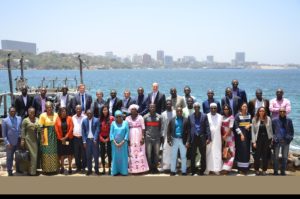Region: Africa
U4E Initiative to accelerate adoption of sustainable cooling solutions in developing economies

Brian Holuj
PARIS, France, 6 August 2019: The UN Environment’s United for Efficiency (U4E) Initiative partners with developing and emerging economies to accelerate the switch to energy-efficient and climate-friendly cooling solutions, said Brian Holuj, Programme Officer, U4E. Holuj added that implementing the right policies and frameworks is key to sustainable development, which ensures economic growth, enhances energy security, improves health and mitigates greenhouse gas emissions and pollution from refrigerators and air conditioners.
Touching on key activities under the programme, Holuj said that there are currently six financial mechanisms underway to unlock USD 30 million in investment towards energy-efficient and climate-friendly cooling products. Considering the diversity in the demographic, political frameworks and economies of countries across Africa, Holuj said that it is important for U4E to identify an approach that is scalable for all types of communities, taking into account the different varieties of products. “It has to be a balance,” he said. “It’s not one financial mechanism to save all, but a way to use innovative finance to unlock adoption of efficient cooling. We are trying to understand the environment, the utility tariffs, the lending rates from banks and what sort of testing can be done to products to make sure of the quality. We are in 40 countries around the world, so there are a lot of insights we can bring, and we are trying to see what makes sense in the local market.”
Holuj added that U4E is actively working with more than 10 countries to pilot National Product Registration Systems to monitor the market, get data, enforce rules, share information and facilitate compliance. “We are trying to come up with a common template to make it easier for manufacturers,” he said. “[Rather than having] to comply with many different types of monitoring systems, if they had to just have one sort of data entry at one time, it makes it easier. We are trying to come up with tools to lower transaction cost for manufacturers and help government monitor what’s happening [in the market].”

During the inception meeting for ECOFRIDGES Project, one of the initiatives under U4E, in Dakar, Senegal in May 2019
Holuj shared that U4E is also coming up with two Model Regulations for air conditioners and refrigerators by way of addressing minimum energy performance standards, which are aimed at regional harmonisation across Africa and beyond. “We look at local trends, performance, MEPS and labeling that countries are setting and coming up with a common set of MEPS and labeling requirements as a starting point for them to consider,” he explained. “Of course, they have to understand context of the market and talk to industries.”
Holuj said local governments can also help drive a lot of adoption, especially if government procurement practices show stricter preference for energy-efficient products. “There are different ways we hit at different audiences,” he said. “We don’t ever want to be in a situation where we only talk to one ministry or one company or one village representative. We engage with a cross-section.” Holuj stressed that all of U4E’s work is undertaken in partnership with government and with energy environmental ministries, and conducted in consultation with local industries. “We are dealing with policy, capacity building, community outreach and financial mechanisms,” he said. “We need to understand private-sector perspective, government perspective and civil society perspective.”
Holuj said that the model regulations also aim to address GWP refrigerant limits across emerging countries. “It really depends on the availability within the respective market and on what’s viable,” he said. “We do not just recommend some number that is made up. It’s going to depend on what’s practical in the market place. We are technology-neutral, and it depends on the ambition of country and what’s appropriate.” Holuj said that this task is easier when it comes to refrigerators, considering well over half the new residential refrigerants are using R-600A. “We are encouraging the use of something along those lines and putting GWP upper limit in that neighborhood,” he said, “But we have to see what market assessment is showing.”
Holuj said that while energy efficiency is driving efforts to adopt sustainable refrigeration, the need to strengthen the cold chain in a bid to reduce food loss and food waste, especially in the high-ambient conditions of Africa, is also of equal importance. “The project deals with both policy and outreach as much as it does [with] the financial scheme,” he said. “It is really in the policy arena, where we can make recommendations on the cold chain. Refrigeration is an important piece, and the last step in the chain is to help avoid massive food losses of 40-50% of the crops grown, which spoil before they reach consumers.” Holuj added that there is targeted work to create a leaner cold chain, ongoing in Rwanda. “It’s about coming up with sustainable business model with farmers.” he said. “It’s about cost-effective, reliable technology to pre-cool produce, clean, prepare, ship and maintain cold chain.”
Holuj emphasised that policies that incentivise adoption of more sustainable refrigeration and air conditioning equipment also create greater clarity in the market, which provides a clear price signal to manufacturers. “If you talk about better economies of scale, more people buying energy-efficient products will, hopefully, lower products prices,” he said. If a country has no labelling or energy efficiency standards, Holuj added, manufacturers have to compete with used products dumped from oversees, making it difficult to introduce more efficient products to local consumers, which is currently a challenge facing markets across Africa.


